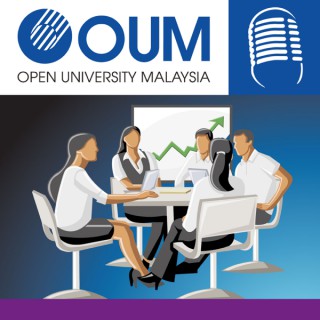
(Podcast) Principles of Management
Follow (Podcast) Principles of ManagementPrinciples of Management is one of the courses offered by OUM Business School at Open University Malaysia (OUM).
- Jun 10, 2015 LATEST EPISODE
- infrequent NEW EPISODES
- 7m AVG DURATION
- 10 EPISODES
More podcasts from Open University Malaysia
Latest episodes from (Podcast) Principles of Management

Topic 9 covers control. This topic discusses the steps in the control process. Also discussed are the three types of control methods and five forms of control. Finally, this topic will discuss the factors that must be controlled by organisations such as finance, human resource, quality and also customer.

Topic 8 discusses leadership. This topic will discuss leadership based on three approaches which are the leader-centred approach, follower-centred approach and interactive approach. The leader-centred approach focuses on the characteristics of the leaderÊs personality, behaviour of the leader and style of leadership. Under the behavioural approach, the researches by the Ohio State University, Michigan University and the Management Grid, will be discussed. The follower-centred approach focuses on the variables of replacement and neutralisation of leadership. In the interactive approach, the Situation Leadership Model, Fiedler Contingency Model, and the Path-Goal and the Continuum of Leadership Behaviour will also be discussed. At the end of this topic, strategic leadership will be presented."

Topic 10 focuses on teams. This topic starts with the differences found between teams and groups, the advantages and disadvantages of teams and when teams are used. Also discussed are the types of teams that exist in an environment. Several features of teams and issues that can influence the performance level of teams will also be discussed.

Topic 4 discusses the design of an organisation. Several factors that influence the structure of an organisation such as strategies, size, environment and technology will be discussed. The types of organisations such as departmentalisation based on functions, products, customers, geographical location and matrix will also be explained. This is followed by management of organisations which involves authority, chain of command, span of control, delegation, centralisation and decentralisation. This topic will also discuss work design that involves work specialisation, job rotation, job enrichment and job enlargement. Finally, this topic will also explain the mechanistic and organic organisational designs and several other types of new structures.

Topic 7 discusses motivation. Two types of motivation models that will be discussed are the needs based and process based models. These include Maslow's Hierarchy of Needs Model, Herzberg's Two Factor Theory, McClelland's Needs Achievement Model, Expectancy Model, Equity Theory, Goal-Setting and Reinforcement Theory.

Topic 2 discusses planning as one of the most important functions in management. The processes involved in effective planning, types of planning as well as the advantages and disadvantages of planning are discussed.

Topic 3 discusses decision making - the process of identifying problems, generating alternative solutions, selecting and implementing the best solutions available. This topic also discusses the situations of decision making - certain conditions, uncertain conditions, and risky conditions - and the steps involved in rational decision making. The types of limitations in the process of decision making, which are bounded rationality, common mistakes and risky environment, will also be discussed. Finally, this topic also discusses the two methods to improve the quality of decisions to be made using specific rules and tests. Group decision making is also discussed."

Topic 5 focuses on human resource management. This topic discusses human resource planning, recruitment techniques and selection of employees. Also discussed is the importance of training, performance evaluation, remuneration and termination of employees.

Topic 6 covers communication, where the basic elements in a communication process are described. The formal communication systems that are frequently used, such as the vertical, horizontal and diagonal communication are also presented. Also discussed are informal communication and non-verbal communication. This topic also discusses the methods to enhance communication by identifying the barriers to communication including the steps to overcome it.

Topic 1 gives an overview on management and the roles that must be played by the manager. The management skills required at different levels of management will also be introduced. Students will be exposed to the evolution of management thoughts that explains the thinking contributed by the main management thinkers over the years.

















